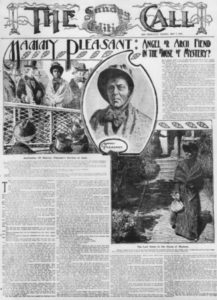 In honor of Black History Month, we are honoring key members of the African American community who have made a lasting impact on the financial industry.
In honor of Black History Month, we are honoring key members of the African American community who have made a lasting impact on the financial industry.
An astute investor and talented chef, Mary Ellen Pleasant did not mince words.
Asked to list her profession in the 1890 census, Pleasant wrote “Capitalist”, both an accurate and lofty label for the former slave.
She famously received a letter from a pastor in which he addressed her as “Mammy Pleasant,” a nickname she despised.
“I wrote back to him on his own paper that my name was Mrs. Mary E. Pleasant. I wouldn’t waste any of my paper on him,” she reportedly said.
Born into slavery and then sold as an indentured servant, Pleasant and her eventual business partner amassed a fortune of more than $30 million, which she used to help fund the abolitionist movement. In fact, she wrote and initialed a note found in abolitionist John Brown’s pocket after he was hanged for murder and treason. She also had given him $30,000 for the cause and promised to send more as needed.
Pleasant began building her fortune by taking advantage of her combined talents for catering and self-education. She opened her own restaurant in San Francisco and eventually bought several restaurants, boarding houses and laundries all with the goal of employing freed slaves.
An important conductor on the Underground Railway, Pleasant earned the title “Black City Hall”, because she so regularly granted start-up funds and found jobs for San Francisco’s African American population.
Working with a white man named Thomas Bell, Pleasant also invested in silver and together they became extremely successful. Though she initially passed as a white woman, Pleasant updated her race affiliation on the census after the Civil War, saying “I’d rather be a corpse than a coward.”
In the late 1860s, she successfully sued two railway companies in San Francisco for discrimination, which led to San Francisco outlawing segregation on all its streetcars and public transportation.
After Thomas Bell’s death, Pleasant realized the miscalculation of placing almost all of her portfolio, including the massive mansion she designed and had built, in Bell’s name. They did it due to the difficulties women in business, especially minorities, faced, but the move ended up leaving Pleasant destitute after Bell’s widow sued Pleasant and won control of the entire estate.
Though she died in poverty, Pleasant left a legacy of business acumen and civil rights activism. A small park in San Francisco bears her name, as does a street in Knob Hill, and her burial site has been designated a “Network to Freedom” site.